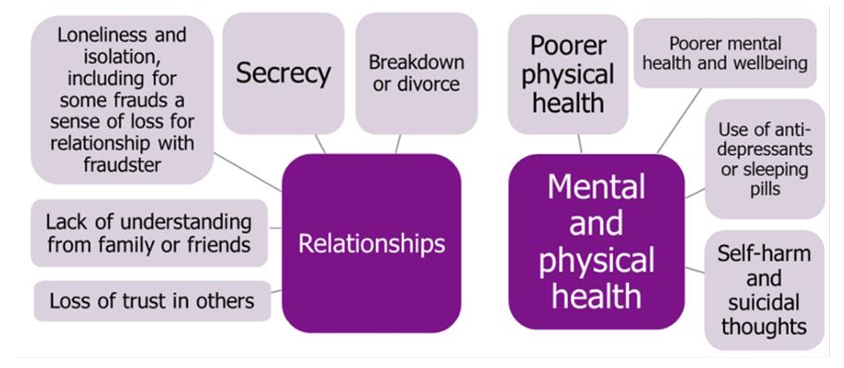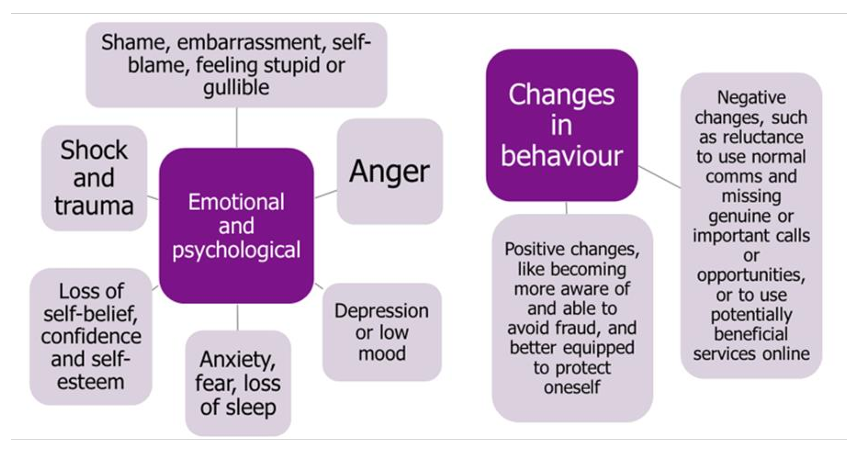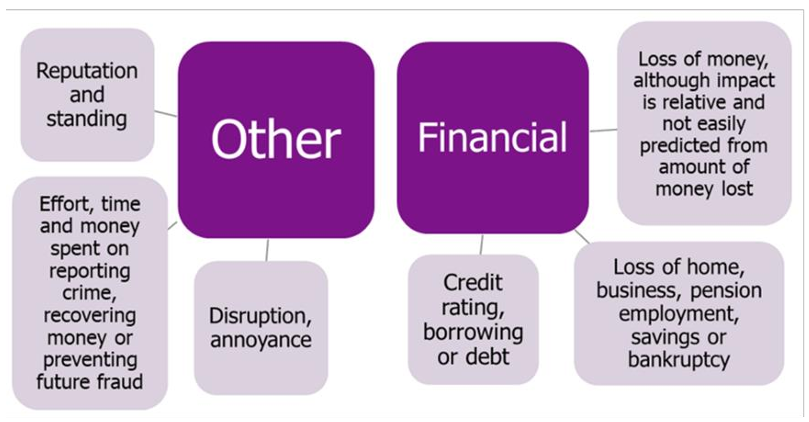UK Government: Social and Psychological Implications of Fraud
Psychology of Scams
Authors:
• UK Parliament – Government of the United Kingdom
• SCARS Editorial Team – Society of Citizens Against Relationship Scams Inc.
About This Article
Fraud poses a significant threat to the UK, with 4 in 10 offences targeting individuals. The government’s 2023 Fraud Strategy aims to combat this, emphasizing victim support and prevention.
While stereotypes of elderly victims persist, fraud risks vary due to psychological and social factors. Beyond financial loss, fraud inflicts emotional and psychological harm.
Victims often report fraud to banks rather than authorities. Effective prevention strategies involve education and enhanced victim care. This POSTnote underscores the multifaceted nature of fraud and the need for comprehensive, collaborative approaches to mitigate its impact on individuals in England and Wales.

UK Government: Social and Psychological Implications of Fraud
The Complex UK Challenges of Fraud Against Individuals in the United Kingdom: Insights and Strategies for Prevention
An Analysis of the Psychology and Sociology of Scams & Fraud
The UK Government has acknowledged fraud as a “significant threat to the people, prosperity and security of the UK”.
In 2023, fraud was the most common offence against individuals.
There are many different types of fraud against individuals, such as bank and credit account frauds or purchase frauds. Government and stakeholders have highlighted particular concerns about ‘authorised push payment’ (APP) frauds, where fraudsters trick victims into making payments or sharing information like account details. These often involve ‘social engineering’, where fraudsters create a direct relationship with victims to manipulate them.
Government, law enforcement, private sector and third sector bodies are involved in the response to fraud against individuals. Following rises in fraud during the Covid-19 pandemic, since 2023, there has been a renewed government focus on addressing fraud and its impacts. The cross-sector Home Office-led Fraud Strategy aims to reduce fraud by 10% from 2019 levels by December 2024. It includes specific aims to improve victim support; reimburse more victims; and improve communications. Other policy developments include the Online Safety Act 2023 and the Online Fraud Charter.
This POSTnote focuses on fraud against individuals, although fraud can also occur against public sector, commercial and charitable bodies. It applies to England and Wales; legal, policing and criminal justice approaches to fraud may differ in the other nations of the UK.
Key points
- Fraud accounts for 4 in 10 offences against individuals. 6% of adults were a victim of fraud in 2023. There are many types of fraud, such as purchase or romance frauds. Fraud changes quickly and much is cyber-related.
- The UK Government’s 2023 Fraud Strategy includes aims to improve victim support, reimburse more victims and improve communications. It also seeks to prevent more frauds from taking place. This will involve actions by government, law enforcement, the private sector, and individuals.
- The stereotype of elderly fraud victims is inaccurate compared to observed fraud risks. Psychological and social factors may affect risk, for example, individual personalities, circumstances, or market-related vulnerabilities, such as demand for rental accommodation.
- In addition to financial loss, fraud can cause emotional, psychological and health impacts, and can harm people’s relationships. Impacts may vary for individual victims, and by different fraud characteristics.
- Victims are most likely to report fraud to their bank or account provider, rather than the national reporting service Action Fraud or police.
- The published evidence base for fraud against individuals is limited. However, academics and practitioners suggest several areas to consider in implementing effective fraud prevention, including education, and victim care.
Psychological & Social Impact on Fraud Victims
UK Parliament Post Report: Social and psychological implications of fraud
-/ 30 /-
What do you think about this?
Please share your thoughts in a comment below!
Statement About Victim Blaming
SCARS Institute articles examine different aspects of the scam victim experience, as well as those who may have been secondary victims. This work focuses on understanding victimization through the science of victimology, including common psychological and behavioral responses. The purpose is to help victims and survivors understand why these crimes occurred, reduce shame and self-blame, strengthen recovery programs and victim opportunities, and lower the risk of future victimization.
At times, these discussions may sound uncomfortable, overwhelming, or may be mistaken for blame. They are not. Scam victims are never blamed. Our goal is to explain the mechanisms of deception and the human responses that scammers exploit, and the processes that occur after the scam ends, so victims can better understand what happened to them and why it felt convincing at the time, and what the path looks like going forward.
Articles that address the psychology, neurology, physiology, and other characteristics of scams and the victim experience recognize that all people share cognitive and emotional traits that can be manipulated under the right conditions. These characteristics are not flaws. They are normal human functions that criminals deliberately exploit. Victims typically have little awareness of these mechanisms while a scam is unfolding and a very limited ability to control them. Awareness often comes only after the harm has occurred.
By explaining these processes, these articles help victims make sense of their experiences, understand common post-scam reactions, and identify ways to protect themselves moving forward. This knowledge supports recovery by replacing confusion and self-blame with clarity, context, and self-compassion.
Additional educational material on these topics is available at ScamPsychology.org – ScamsNOW.com and other SCARS Institute websites.
-/ 30 /-
What do you think about this?
Please share your thoughts in a comment below!
SCARS LINKS: AgainstScams.org RomanceScamsNOW.com ContraEstafas.org ScammerPhotos.com Anyscam.com ScamsNOW.com
reporting.AgainstScams.org support.AgainstScams.org membership.AgainstScams.org donate.AgainstScams.org shop.AgainstScams.org
youtube.AgainstScams.org linkedin.AgainstScams.org facebook.AgainstScams.org
TABLE OF CONTENTS
- Psychology of Scams
- About This Article
- UK Government: Social and Psychological Implications of Fraud
- The Complex UK Challenges of Fraud Against Individuals in the United Kingdom: Insights and Strategies for Prevention
- Key points
- Psychological & Social Impact on Fraud Victims
- UK Parliament Post Report: Social and psychological implications of fraud
CATEGORIES
![NavyLogo@4x-81[1] UK Government: Social and Psychological Implications of Fraud - 2024](https://scamsnow.com/wp-content/uploads/2025/04/NavyLogo@4x-811.png)
ARTICLE META
Important Information for New Scam Victims
- Please visit www.ScamVictimsSupport.org – a SCARS Website for New Scam Victims & Sextortion Victims.
- SCARS Institute now offers its free, safe, and private Scam Survivor’s Support Community at www.SCARScommunity.org – this is not on a social media platform, it is our own safe & secure platform created by the SCARS Institute especially for scam victims & survivors.
- SCARS Institute now offers a free recovery learning program at www.SCARSeducation.org.
- Please visit www.ScamPsychology.org – to more fully understand the psychological concepts involved in scams and scam victim recovery.
If you are looking for local trauma counselors, please visit counseling.AgainstScams.org
If you need to speak with someone now, you can dial 988 or find phone numbers for crisis hotlines all around the world here: www.opencounseling.com/suicide-hotlines
Statement About Victim Blaming
Some of our articles discuss various aspects of victims. This is both about better understanding victims (the science of victimology) and their behaviors and psychology. This helps us to educate victims/survivors about why these crimes happened and not to blame themselves, better develop recovery programs, and help victims avoid scams in the future. At times, this may sound like blaming the victim, but it does not blame scam victims; we are simply explaining the hows and whys of the experience victims have.
These articles, about the Psychology of Scams or Victim Psychology – meaning that all humans have psychological or cognitive characteristics in common that can either be exploited or work against us – help us all to understand the unique challenges victims face before, during, and after scams, fraud, or cybercrimes. These sometimes talk about some of the vulnerabilities the scammers exploit. Victims rarely have control of them or are even aware of them, until something like a scam happens, and then they can learn how their mind works and how to overcome these mechanisms.
Articles like these help victims and others understand these processes and how to help prevent them from being exploited again or to help them recover more easily by understanding their post-scam behaviors. Learn more about the Psychology of Scams at www.ScamPsychology.org
SCARS INSTITUTE RESOURCES:
If You Have Been Victimized By A Scam Or Cybercrime
♦ If you are a victim of scams, go to www.ScamVictimsSupport.org for real knowledge and help
♦ SCARS Institute now offers its free, safe, and private Scam Survivor’s Support Community at www.SCARScommunity.org/register – this is not on a social media platform, it is our own safe & secure platform created by the SCARS Institute especially for scam victims & survivors.
♦ Enroll in SCARS Scam Survivor’s School now at www.SCARSeducation.org
♦ To report criminals, visit https://reporting.AgainstScams.org – we will NEVER give your data to money recovery companies like some do!
♦ Follow us and find our podcasts, webinars, and helpful videos on YouTube: https://www.youtube.com/@RomancescamsNowcom
♦ Learn about the Psychology of Scams at www.ScamPsychology.org
♦ Dig deeper into the reality of scams, fraud, and cybercrime at www.ScamsNOW.com and www.RomanceScamsNOW.com
♦ Scam Survivor’s Stories: www.ScamSurvivorStories.org
♦ For Scam Victim Advocates visit www.ScamVictimsAdvocates.org
♦ See more scammer photos on www.ScammerPhotos.com
You can also find the SCARS Institute’s knowledge and information on Facebook, Instagram, X, LinkedIn, and TruthSocial
Psychology Disclaimer:
All articles about psychology and the human brain on this website are for information & education only
The information provided in this and other SCARS articles are intended for educational and self-help purposes only and should not be construed as a substitute for professional therapy or counseling.
Note about Mindfulness: Mindfulness practices have the potential to create psychological distress for some individuals. Please consult a mental health professional or experienced meditation instructor for guidance should you encounter difficulties.
While any self-help techniques outlined herein may be beneficial for scam victims seeking to recover from their experience and move towards recovery, it is important to consult with a qualified mental health professional before initiating any course of action. Each individual’s experience and needs are unique, and what works for one person may not be suitable for another.
Additionally, any approach may not be appropriate for individuals with certain pre-existing mental health conditions or trauma histories. It is advisable to seek guidance from a licensed therapist or counselor who can provide personalized support, guidance, and treatment tailored to your specific needs.
If you are experiencing significant distress or emotional difficulties related to a scam or other traumatic event, please consult your doctor or mental health provider for appropriate care and support.
Also read our SCARS Institute Statement about Professional Care for Scam Victims – click here
If you are in crisis, feeling desperate, or in despair, please call 988 or your local crisis hotline – international numbers here.
More ScamsNOW.com Articles
A Question of Trust
At the SCARS Institute, we invite you to do your own research on the topics we speak about and publish. Our team investigates the subject being discussed, especially when it comes to understanding the scam victims-survivors’ experience. You can do Google searches, but in many cases, you will have to wade through scientific papers and studies. However, remember that biases and perspectives matter and influence the outcome. Regardless, we encourage you to explore these topics as thoroughly as you can for your own awareness.




























![scars-institute[1] UK Government: Social and Psychological Implications of Fraud - 2024](https://scamsnow.com/wp-content/uploads/2025/04/scars-institute1.png)

![niprc1.png1_-150×1501-1[1] UK Government: Social and Psychological Implications of Fraud - 2024](https://scamsnow.com/wp-content/uploads/2025/04/niprc1.png1_-150x1501-11.webp)